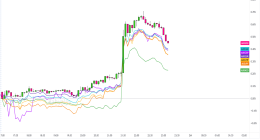
Liberals and conservatives often seem to speak different languages. A new study using artificial intelligence says that is now literally true.
Researchers at Carnegie Mellon University collected more than 86.6 million comments from more than 6.5 million users on 200,000 YouTube videos, then analyzed them using an AI technique normally employed to translate between two languages.
The researchers found that people on each side of the political divide often use different words to express similar ideas. For instance, the term “mask” among liberal commenters is roughly equivalent to the term “muzzle” for conservatives. Similar pairings were seen for “liberals” and “libtards” as well as “solar” and “fossil.”
Ashique KhudaBukhsh, a project scientist at CMU involved with the study, says the polarization of American political discourse in recent years inspired him and colleagues to see if translation techniques might identify terms that were used in similar contexts by people with different views.
“We are practically speaking different languages—that’s a worrisome thing,” KhudaBukhsh says. “If ‘mask’ translates to ‘muzzle,’ you immediately know that there is a huge debate surrounding masks and freedom of speech.”
In the study, the Carnegie Mellon researchers used a technique that has spurred big improvements in automated translation of words and phrases between different languages. It relies on examining how often a word appears close to other known words and comparing the pattern with another language. For instance, the relationship between the terms “car” and “road,” expressed mathematically, may be the same in two different languages, allowing a computer to learn how to infer the correct translation of one of the terms.
In the case of the politically tinged comments, the researchers found that different words occupy a similar place in the lexicon of each community. The paper, which has been posted online but is not yet peer reviewed, looked at comments posted beneath the videos on four channels spanning left- and right-leaning US news—MSNBC, CNN, Fox News, and OANN.
KhudaBukhsh says social networks might use techniques like the one his team developed to build bridges between warring communities. A network could surface comments that avoid contentious or “foreign” terms, instead showing ones that represent common ground, he suggests. “Go to any social media platform; it has become so toxic, and it’s almost like there is no known interaction” between users with different political viewpoints, he says.
But Morteza Dehghani, an associate professor at the University of Southern California who studies social media using computational methods, finds the approach problematic. He notes that the Carnegie Mellon paper considers “BLM” (Black lives matter) and “ALM” (all lives matter) a “translatable” pair, akin to “mask” and “muzzle.”









